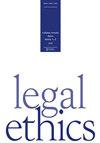Pride and prejudice: a case for reform of judicial recusal procedure
IF 0.3
Q1 LAW
引用次数: 3
Abstract
ABSTRACT Justice must both be done and be seen to be done. A legal principle designed to give effect to this fundamental proposition is that a judge must not sit to determine a dispute if he or she is biased, or if there exists a reasonable perception that he or she is biased. Across many common law jurisdictions – including the UK, Australia, Canada, New Zealand and many jurisdictions in the United States – the judge in question himself or herself is required to undertake the assessment of whether bias, or an apprehension of bias, exists. Drawing on insights from behavioural psychology and a series of case studies from across these jurisdictions, this paper offers an extended analysis of this practice and identifies and evaluates alternative proposals.傲慢与偏见:司法回避程序改革案例
正义必须得到伸张,也必须被视为正义得到伸张。为实现这一基本主张而设计的一项法律原则是,如果法官有偏见,或者有合理的看法认为他或她有偏见,则法官不得开庭裁定争议。在许多普通法管辖区,包括英国、澳大利亚、加拿大、新西兰和美国的许多管辖区,相关法官本人必须评估是否存在偏见或对偏见的担忧。本文借鉴了行为心理学的见解和来自这些司法管辖区的一系列案例研究,对这种做法进行了扩展分析,并确定和评估了替代方案。
本文章由计算机程序翻译,如有差异,请以英文原文为准。
求助全文
约1分钟内获得全文
求助全文

 求助内容:
求助内容: 应助结果提醒方式:
应助结果提醒方式:


